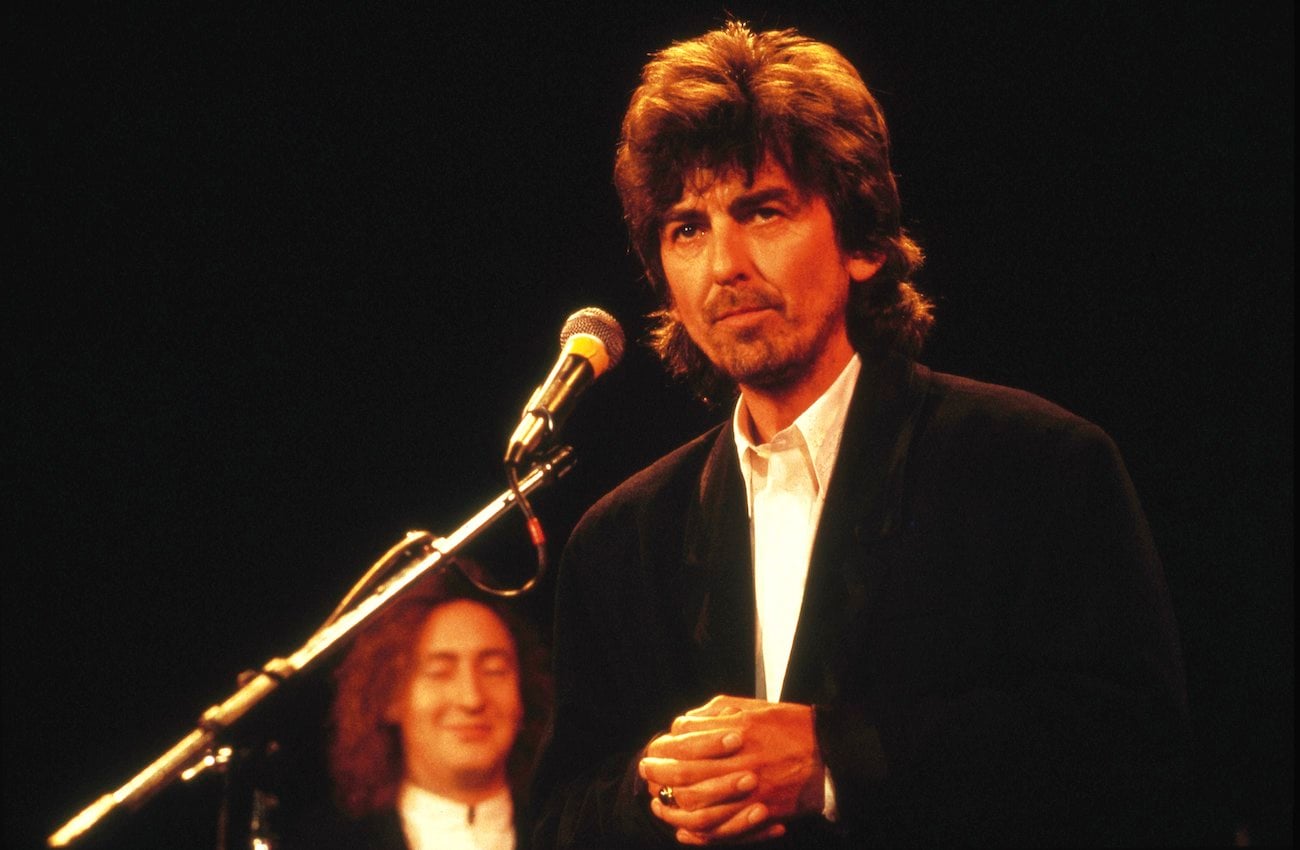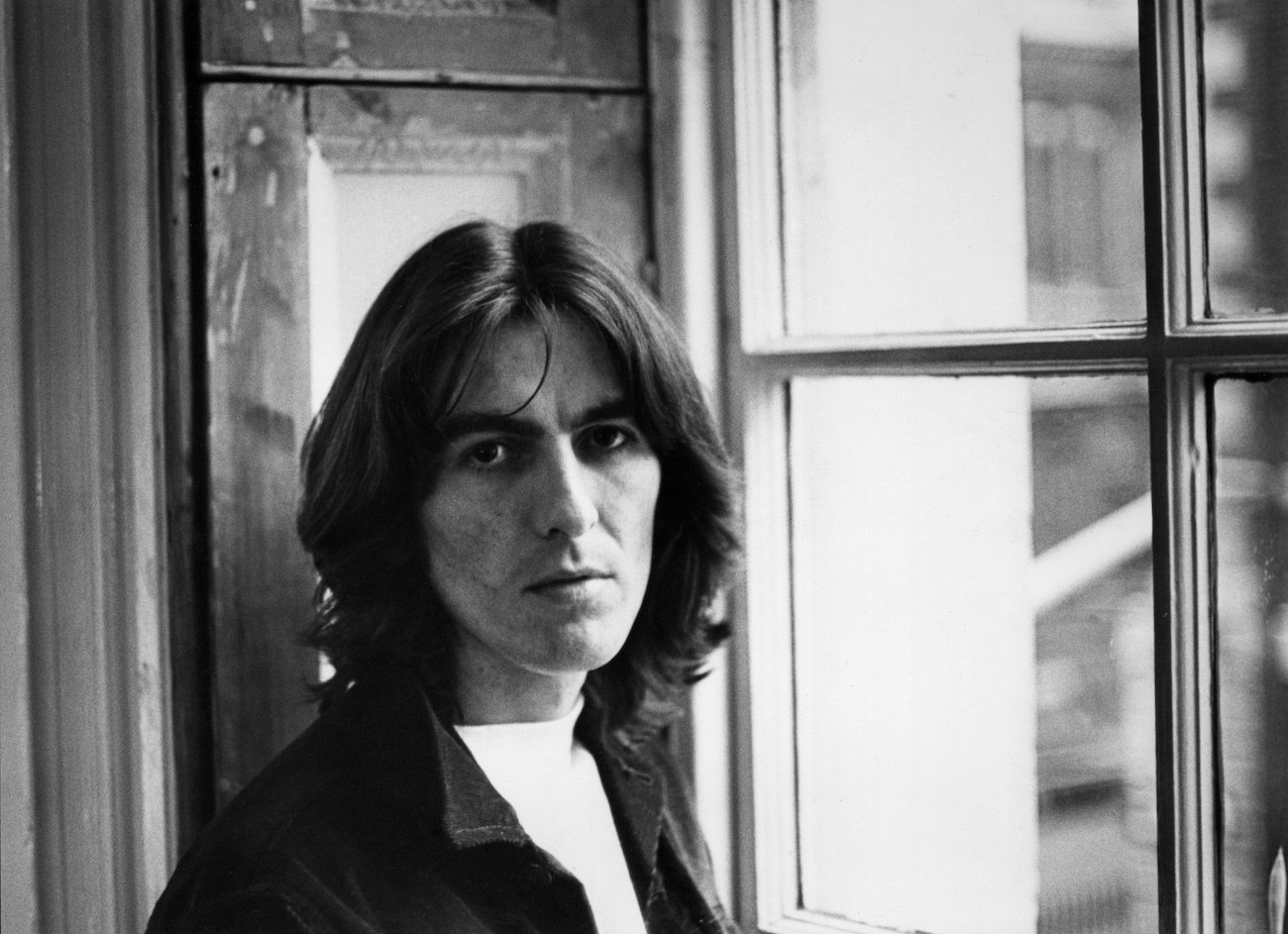
George Harrison Said He Wrote Songs More Easily if He Was Working Toward a Deadline
Unbelievably, George Harrison struggled to write songs sometimes. More often than not, it was a painstaking process, prying his jumbled thoughts from his head. The only thing that seemed to be able to extract them was a deadline.

George Harrison said he wrote songs more easily when he was under a deadline
With some of the best rock ‘n’ roll songs in his catalog, including “Something,” “While My Guitar Gently Weeps,” and “All Things Must Pass,” it’s hard to imagine George Harrison struggling to write songs. However, it happened often.
In his former sister-in-law, Jenny Boyd’s 1988 book, It’s Not Only Rock ‘n’ Roll (per George Harrison on George Harrison: Interviews and Encounters), George spoke about his creative process.
He explained, “I find that, having just finished writing and recording an album, I tend to now work in spurts. At one point I think, ‘How do you write a tune?’ I have just totally forgotten. But unlike some people who think they’ve dried up, I don’t believe we dry up.
“Some people are really good at it; they’ll set themselves an hour or two every day to go in there and write something. I don’t do that. Somebody will say something or I’ll see something, and I’ll write it down on a piece of paper and later it will come into a tune.
“But the way I am at the moment I do have to force myself to do it; that’s why deadlines are good. I never used to think I could write songs about specific things. I used to just write and the song would be whatever it became. Now somebody will ask me to write a song for a movie, and this is what’s happening. I’ve done a bit of that lately and that’s good too. You have to make yourself inspired.”
Understandably, George got a lot of work done under a deadline. Some people’s thoughts come quicker and more accurately under pressure. However, George didn’t really need deadlines to help him write songs.
George Harrison had a hard time figuring out what he wanted to say in his songs
One of George’s biggest problems while writing songs was figuring out what he wanted to say.
In a 1972 interview, George told the Record Mirror, “I find I write more easily if I’m writing to a deadline. For instance, if I’ve got a session booked for a certain date, I know all the songs have to be finished by them. So I get them finished.
“I find the main problem is that there is very little I want to say. If you’ve got a lot to say, the lyrics come easy — if you really want to tell the world about something you can sit down and work something out. But sometimes I sit down and write a song where I say everything in the first verse — then I have to struggle to think of a second verse, middle bit, third verse and so on.
“When I write songs I work mainly on guitar because that’s the instrument I play, but sometimes I do things on the piano because that way, being unfamiliar with the instrument, you can come up with things you wouldn’t normally attempt.”
Part of the problem with not knowing what to say is how to say it. In her introduction to the 2017 reissue of George’s memoir, I Me Mine, George’s wife, Olivia, wrote, “Many times he said, ‘I wish I knew more words,’ but perhaps all the words in the world, including the Sanskirt and mantras integral to his vocabulary, could not fully express his depth of feeling and realisation.
“George didn’t give much away when explaining his lyrics. Wasn’t it enough that he laid his emotions and thoughts on the line for everyone to hear? I finally stopped asking George what his songs were about because his answers never seemed to satisfy my questions. ‘Liv, I just needed something to rhyme with ‘love,’ so I used ‘glove.'”
George’s initial inspiration changed by the time he finished a song
Finding something to say and how to say it sometimes didn’t matter. During the songwriting process, George’s initial inspiration would often morph into something else by the time he finished the song.
“We relate music and words to our own personal life experience, but some of George’s songs are truly revealed only through a deeper realisation of meaning and by allowing the melody, the lyrics, intonation and phrasing to seep in to tell the story, unfiltered by our own interpretations,” Olivia continued.
“In the summer of 2001 we were discussing his songwriting and he told me that whatever thought or theme inspired a lyric usually metamorphosed by the end of the song, sometimes before the pencil even reached the paper, as in ‘Your Love is Forever.'”
“He began that song by writing about the days we were first immersed in our love affair with Hawaii and each other but the love in the opening verse soon turned into Divine Love. George wrote, ‘My love belongs to who can see it’ and his songs belong to those who can really hear them.
“George’s lyrics often captivated us with one image and then led us to a loftier realm, transcending his initial inspiration.”
That happened a lot when George was writing a love song. He might have started to write a love song, but it eventually became about his love for God. Then, no one knew if he was writing about his love of God or a woman, but George liked that ambiguity.
In terms of his songwriting process, though, George should’ve listened to his own spirituality. He often said that if there was a God, we must see him. God is always around; you just have to know how to look for him. George’s songs were there, out in the universe somewhere. He didn’t need deadlines to help him figure them out. George needed to go to the places he went to find God.


